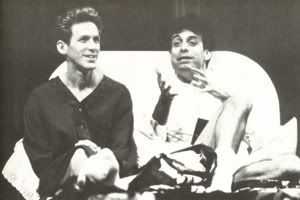
I was thumbing through "Angels in America" for the kazillionith time recently, and began to wax poetically on ethics. “The shaping of the law, not its execution.” Louis ponders the nature of justice in bed beside his lover, Prior. “…it should be the questions and shape of a life…which matters in the end, not some stamp of salvation or damnation which disperses all the complexity in some unsatisfying little decision…”
It’s an interesting supposition to consider. It paints in my mind the image of the tarot card entitled “Judgment”; an angel, eclipsing the horizon, blowing a horn, resurrecting a legion of corpses before the final judgment of Christian tradition; an image that symbolizes this “stamp of salvation or damnation” in a religious life. For the large sect of us who do not subscribe to such an image based on religion, does our secular life hold to similar strictures of judgment? Can our peers judge us in that same way? Can we be damned by society if we do not beg forgiveness for an action? For those of a particular faith, it can be simpler; for others, it cannot.
As the aging Rabbi Chemelwitz points out: “Catholics believe in forgiveness, Jews believe in guilt.” In the Catholic faith, one can commit any transgression he likes, so long as he confesses and repents before his life is over. An entire life composed of immoral, disparaging acts can be rectified in one sitting, thus, the components which make up said life mean little if, before the final judgment is enacted, forgiveness is given. For atheists and agnostics, this is not a scenario in which we can easily place ourselves.
It appears, then, that Louis’s theory is a logical and easily accessible one, especially to people who do not subscribe to a religious faith. Our lives should be judged by the broad spectrum of our actions, by the sum total of what we do and what impression we leave on the world, not one thing we do, whether it be good or bad.
The theory does open up some doors, though, of evasion and disregard towards the transgressions we commit, because to Prior, “…[Louis’s theory] seems to let you off scot-free. …No judgment, no guilt or responsibility.” Does a life of good actions balance out a single misdeed? What if, say, a charity worker commits a murder? If she sacrificed her life helping and aiding hundreds of lives but destroys one, shall she be eternally damned? She can forgive all she wants, but her actions cannot be changed.
Perhaps an amalgam of sorts is in order; perhaps forgiveness is an integral part of an already broad life. Actions cannot be changed, but attitudes can. Perhaps we need to enact the “neo-Hegelian, positivist” sense of the world Louis holds so dearly, confirming that progress, while suffused with pain and struggle, is always for the better. Perhaps we will not get stamped at the end of our lives, but we shall try our hardest to live good ones, no matter how difficult it may be.
[pictured: Joe Mantello and Stephen Spinella, Original Broadway Production]


No comments:
Post a Comment